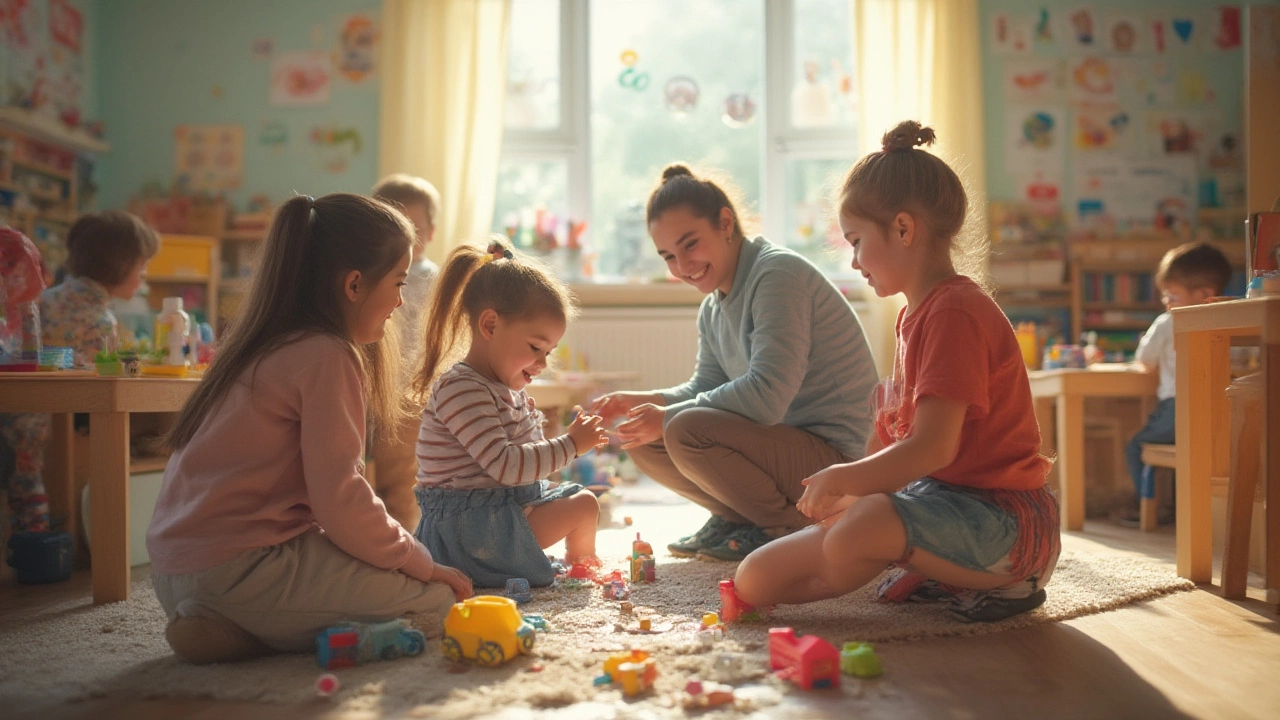-
25
- 0

What Does an Early Years Educator Do? Role, Skills, and Impact Explained
Just imagine a world where sticky-fingered toddlers and curious preschoolers are plotting to turn mashed peas into finger paint, and someone not only anticipates that—she’s ready with wipes, a smile, and a lesson plan. That person? She’s not simply “watching” the kids. She’s an early years educator, quietly shaping the adults these tiny humans will become. Forget the old image of a babysitter in the corner—these are professionals with serious skills, deep knowledge, and a huge influence on young minds. Want to understand what powers their magic? Here’s a real look at what an early years educator actually does, why it matters, and what goes on behind the scenes.
Defining the Role: Early Years Educator vs. Babysitter
Let’s set the record straight right off the bat—calling an early years educator a “babysitter” is like calling a master chef just a home cook. You could do it, but you’d be missing practically everything that separates the two. While babysitters keep kids occupied and safe, early years educators do all that and then dive deep into supporting social, emotional, and cognitive growth. Their focus is early childhood, covering ages from birth to around six years, though most are working with kids between two and five. The difference is training, intention, and, honestly, the scope of the job.
Early years educators often hold formal qualifications—think college degrees in early childhood education, diplomas in childcare, or nationally recognized certifications like the UK’s Level 3 Early Years Educator qualification. In countries like Australia, there’s even a regulated minimum standard for staff education in nurseries and preschools. This is no accident; studies from Yale and Cambridge have shown that well-educated staff directly improve child outcomes, from language skills to emotional security.
The job is pretty far from routine babysitting. Early years educators design learning environments in line with frameworks like the Early Years Foundation Stage (EYFS) in the UK or similar systems worldwide. They plan daily and weekly activities with creativity, blending fun with learning—picture water play that teaches volume, sand tables for fine motor growth, and story circles building literacy. Everything has a reason, like stashing building blocks for spatial skills or singing songs that introduce numbers. The educator watches, observes, and documents progress—spotting language delays, encouraging shy kids to open up, and celebrating milestones that most adults barely notice.
All this happens while they’re keeping a group of young ones safe and happy, fielding questions like “Why is the sky blue?” and “How many ants can you eat before you explode?” (It happens!) In short, early years educators juggle the roles of scientist, nurse, counselor, entertainer, and guide—sometimes all before snack time.
Everyday Life in Early Years Education
Most people underestimate how much multitasking and micro-managing goes into a day in early childhood education. Early years educators begin before the first child arrives, prepping classrooms, cleaning, and organizing activities that nurture learning and independence. Think of walking into a room that looks like chaos—but every toy, puzzle, and beanbag actually has a deliberate place and purpose. There’s a science behind free play; it’s structured to encourage problem-solving, sharing, and experimentation.
One of the delightful facts: children in great early years settings don’t even realize they’re in “lessons.” They’re exploring paint, digging for plastic dinosaurs, or “cooking” with play dough, while their brains are soaking up skills in maths, language, and science. A well-trained educator reads these moments, knowing exactly when to step in with a question (“Can you tell me what happens if you mix blue and yellow?”) and when to let the discovery continue uninterrupted.
The day in an early years classroom doesn’t just move from snack time to story time on autopilot. Educators constantly gauge kids’ energy, moods, and needs. If a group is restless or anxious, routines are adapted. If there’s a new interest—say, bugs in the playground—you can bet tomorrow’s activities are getting a creepy-crawly twist. The best educators build resilience, self-confidence, and curiosity by following each child’s interests while gently steering them toward new horizons.
Throughout all of it, documentation is key. Observations are made with a careful eye: Sam is talking more with other kids today—progress! Mia is stacking blocks higher than she did last week—her fine motor skills are blooming. These notes aren’t just for show; they support reports to parents, track possible concerns early (like delays or behavioral changes), and guide planning. In many countries, legal frameworks require this level of record-keeping for safety and developmental tracking.
Health, hygiene, and safety can’t be overlooked. Early years educators are first responders to scraped knees, sudden fevers, or tricky social conflicts. They’re trained in first aid and child protection—and they know the signs of stress or neglect. Behind the scenes, these professionals liaise with specialists like speech therapists, SENCOs (Special Educational Needs Coordinators), and social workers whenever a child needs extra support.

The Skills and Qualities That Set Early Years Educators Apart
No two days are the same, but early years educators share a set of core skills and qualities that set them apart from other care professionals. First, emotional intelligence is everything. These educators read body language and moods, catching the meaning behind a child’s silence or a sudden meltdown. They have to think on their feet—improvising activities, adapting to fast changes, and shifting gears based on the unpredictable energy of a room full of little ones.
Patience is a given, but it’s paired with the kind of observation skills you’d expect from a detective. Early years educators notice details—a child hesitating to join, holding a crayon with a fisted grip, flinching at loud noises. These glimpses might reveal developmental leaps, sensory sensitivities, or emerging social skills.
Communication is another superpower. You need to “translate” child-speak for parents, summarize developmental milestones, and work with colleagues, health visitors, and (sometimes) authorities. Strong relationships with families are a huge part of the job. Educators give feedback, suggest activities to try at home, and sometimes provide gentle encouragement if things aren’t going so smooth. They don’t just “care” for children—they support parents in being partners in learning.
Creativity, flexibility, and a commitment to lifelong learning are non-negotiable. Curriculums evolve, new theories emerge, and each child brings unique interests and challenges. The best educators attend training sessions, read new research, and swap ideas with their peers. An ever-growing body of research highlights how the first five years are a critical window for brain development, making the need for up-to-date knowledge crystal clear.
And let’s not forget practical skills like first aid certification, knowledge of infection control (which got everyone’s attention during Covid-19), allergen management, and even basic DIY (ever had to fix the leg of a dollhouse during naptime?). It’s a role that demands multitasking on a level that would put most corporate CEOs to shame.
How to Become an Early Years Educator: Training and Career Paths
If your heart swells a little at the thought of helping a tiny person tie their first shoelace, you might be wondering how to join this world. Becoming an early years educator depends on where you live, but there are a few key steps that are mostly universal. In the UK, the minimum qualification is often the Level 3 Early Years Educator diploma. This usually involves a mix of theory and lots of placements in real settings, clocking up hundreds of hours working directly with kids. Some move on to higher education, picking up degrees in Early Childhood Studies or Child Development for more leadership opportunities down the road.
Other countries have similar pathways. In the US, you’ll find the Child Development Associate (CDA) Credential or even four-year degrees to work in certain preschool environments. Australia’s Certificate III in Early Childhood Education and Care is a typical entry point, with further diplomas for advanced roles. Many employers require background checks, up-to-date first aid training, and proof of immunization—safety is always front and center when you’re around at-risk populations.
Once qualified, what are your options? Early years educators are in demand in nurseries, preschools, reception classes, private childcare centers, even in hospitals and community centers. Some work as childminders from their own homes, others specialize in supporting kids with complex needs. It’s a field with real growth; for instance, UNICEF’s 2024 State of the World’s Children report found that investing in early childhood education creates long-term gains for societies—better health outcomes, higher graduation rates, even higher eventual earnings. A skilled early years educator can change the trajectory for hundreds of young lives across a career.
Job satisfaction is high, though pay can be a sticking point in some regions. Still, those in the field talk about the magic moments: a quiet child making her first friend, a wild one learning to regulate his big feelings, or a whole class bursting into irrepressible, joyful laughter. Early years educators model kindness, curiosity, and resilience—not just for the kids, but for the parents and communities they serve.
early years educator roles bring together nearly every kind of skill, from psychology to logistics, art to science, patience to quick thinking. Behind the juice spills, glue sticks, and gym mats, these professionals are quietly building the world we’ll all live in—one child, and one small triumph, at a time.
Write a comment
Tags Weight
- education
- study tips
- adult education
- exam preparation
- online courses
- adult learning
- lifelong learning
- distance learning
- GCSE revision
- online education
- private tutoring
- special needs education
- scholarships
- remote learning
- scholarship tips
- financial aid
- international students
- effective learning
- e-learning
- education funding

Written by Elara Winslow
View all posts by: Elara Winslow